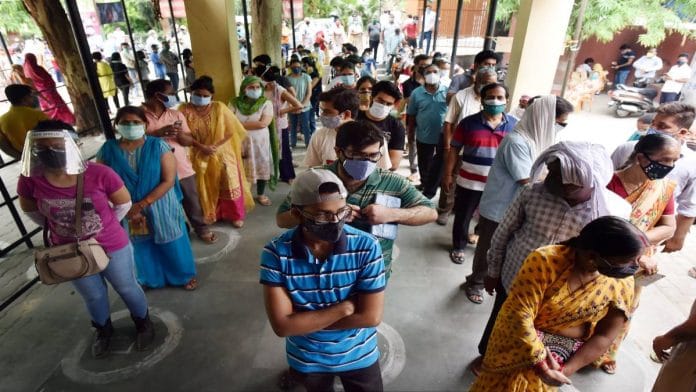New Delhi: A pair of researchers from the Indian Council of Medical Research (ICMR) have recommended that the Covid-19 vaccine should be made free for everyone in India to increase its use and reduce the death toll from the infection.
In an article scheduled to appear in the journal BMJ Global Health this week, Manju Rahi and Amit Sharma from the ICMR-National Institute of Malaria Research also said that approving foreign vaccines that have already been deployed in other countries should be taken up as a matter of urgency. ThePrint has accessed the peer-reviewed version of the article.
According to the duo, despite international aid and approval of vaccines, there was poor planning of vaccine production and its distribution in the country.
“Slow roll out and vaccine shortages have led to complete immunisation of only about 3 per cent of the population,” the authors wrote.
Despite plans to ramp up production of Covaxin and Covishield, the two vaccines that make up national Covid immunisation programme, it may not be possible to vaccinate a billion people this year, they said. Covaxin is the indigenous shot developed by ICMR and Bharat Biotech while Covishield is the AstraZeneca-Oxford University shot being manufactured by Serum Institute of India.
“As any protection conferred by COVID-19 vaccine is expected to take at least 2 weeks after both doses, and with large demands, India will require many more sources of vaccines in the coming days and weeks to stem the current uptick in infections,” the researchers wrote.
Although the Covid-19 vaccination in government hospitals and centres is free of cost, the government has allowed private hospitals to charge for vaccinations.
“Eyeing an expansion of vaccine coverage the government has allowed private hospitals to differentially charge the vaccinees ranging from $3 to $15 (Rs 200 to 1,000),” the researchers wrote.
“Only a small section of the population would be able to afford the vaccine at this cost in the private sector, leaving a substantial proportion of the population unvaccinated and hence unprotected,” they said.
Also read: Pfizer shot after AstraZeneca is safe, could induce better immune response, researchers find
Price at private hospitals, CoWIN platform also factors
The authors also noted that the Modi government’s decision to ask state governments to negotiate vaccine costs for themselves for the target group of those below 45, has further increased the cost of getting vaccinated for the younger population which is higher than those negotiated by the government.
“For instance, one dose of Covaxin costs the central government around $2 (Rs 145), rising to around $5.4 (Rs 393) for state governments, and to around $16 (Rs 1165) for private hospitals,” they pointed out.
This differential pricing at a time of grave crisis is not only creating inequitable distribution, but could also potentially spark public mistrust, the authors said.
They also criticised the government’s policy of pre-registration via a mobile app, since only a third of the people in rural areas have an internet connection, according to the authors.
They added that the funding pledged by the government is not adequate, especially as emerging research points out that a third booster shot may be required for some vaccines.
“Hence, India needs a corpus of funds for the above that covers all future eventualities of vaccine deployment,” the ICMR researchers wrote.
(Edited by Manasa Mohan)
Also read: Covid impact may increase in children if virus changes behaviour, cautions govt






